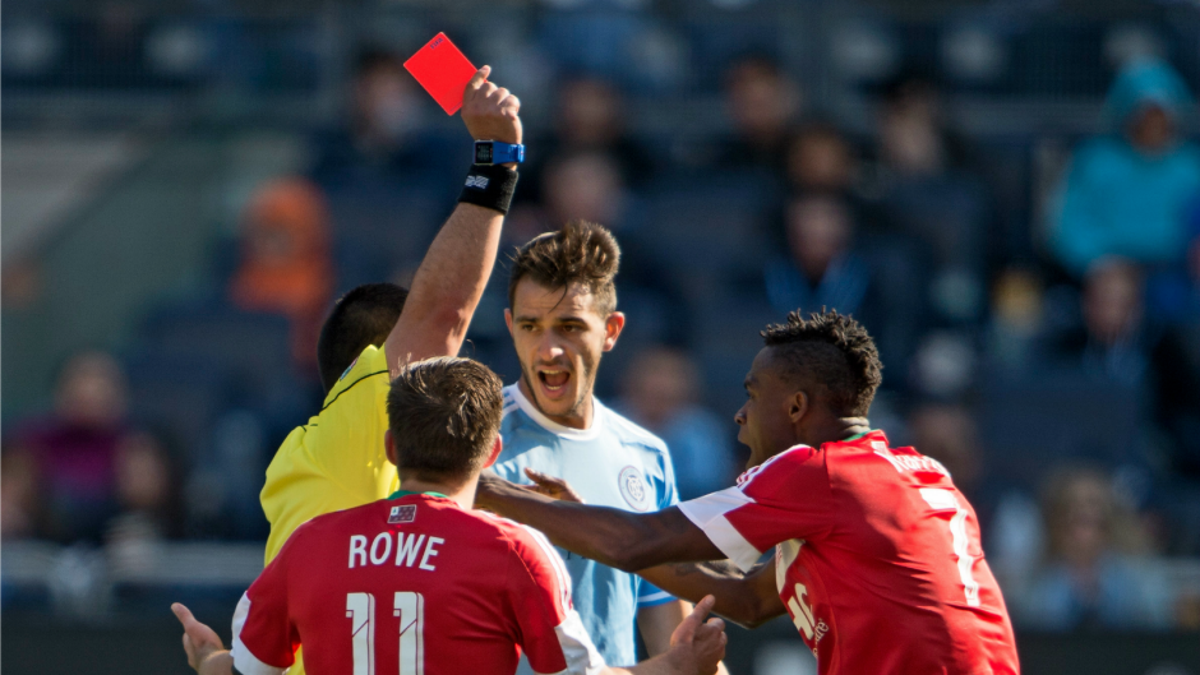
If you've watched MLS this season, you've probably seen a red card or 12. The early part of the season has been a sending off-fest, with 16 players having been given their marching orders in a campaign that is not yet a month old.
The rash of red cards this season is unprecedented. The league is on pace for 48 percent more sendings off than they had a year ago. And this is all by design, at least kind of.
MLS made protecting players a priority in 2016 and spotting red card offenses was one of the four points of emphasis from the league. And the Professional Referees Organization (PRO) are carrying that out, making sure referees are in the right place to spot fouls and ensuring they deal with them appropriately.
According to PRO, the referees spotted just 72 percent of red card offenses in 2015, meaning that 28 percent of the time that a player should have been sent off, he wasn't. The hope was to eliminate that this season and it shows.
The first week of the season brought three red cards, followed by two the next week, but the third week had five red cards. Two more came last week, despite the league having just three matches because of the international break. Finally, four red cards this week brought the total to 16 overall.
The referees have done a pretty good job, considering their mandate. Of the 16 red cards, 12 of them were pretty clear. And even one more - Simon Dawkins' tackle on Sebastian Lletget - wasn't an egregious miss.
Considering one referee is trying to police the entire field and only gets to see the play in real time, with players in his way and not always the idea angle, getting 75 percent of red cards spot on with one more a fine enough call, is pretty good. For all the jokes about MLS refs -- who aren't great, but are demonized far more than is fair -- that's a pretty good showing on sendings off at a time when people are coming down on the referees for all of the 10 or even nine-men soccer games we've seen.
The question is whether all these red cards and the way refs are calling matches is good for the sport and the league. Already, plenty of coaches and players have come out against it.
"There's just been too many red cards in this league, it's ruining games," Bruce Arena told Goal after his Galaxy team played up a man for an hour following a Matias Laba red card. "Those are difficult games and it doesn't make the game entertaining and I don't think the fans like it. It seems like every game in this league, there's a red card, and it's been tough."
The sentiment is shared by players too.
"I understand what MLS is trying to do by protecting the players, but right now, we're trying to take tackling out of the game," Whitecaps goalkeeper David Ousted said. "That's not going to purify the game. It's not going to make it any prettier to look at, and it's especially not going to evolve this league. I think it ruins games more than it benefits the players."
Toronto FC midfielder Will Johnson doesn't think it's a referee problem because referees are being consistent and it is clear what is and isn't a red card. It's simply a matter of the standard not being good for the sport.
The desire from MLS and PRO to protect players is good. There's nobody who would question the intentions. But whether this is the way to do it and whether the unintended consequences make for a better sport are up for debate.
Most of the criticism from those who watch, play and coach in the league is about how many teams have had to play with 10 men. Some have quibbled with the elimination of tackling, but if there were fewer red cards, many would no longer have any issues with the way referees are calling matches.
How MLS and PRO respond now will be interesting. They could instruct referees to scale back, but they may also like what they see. With more and more players harshly penalized for tackles they don't want in the sport, maybe players will adjust. If they stop going in on such tackles, the refs won't have to show as many reds and the league will get the safer, better game they want.
Whether everyone involved is committed to seeing this mandate through and still believe they can get the results they want is still to be seen. But for now, there are red cards, a lot of them. And that isn't an accident. It's by design, in a weird, but potentially good way.
